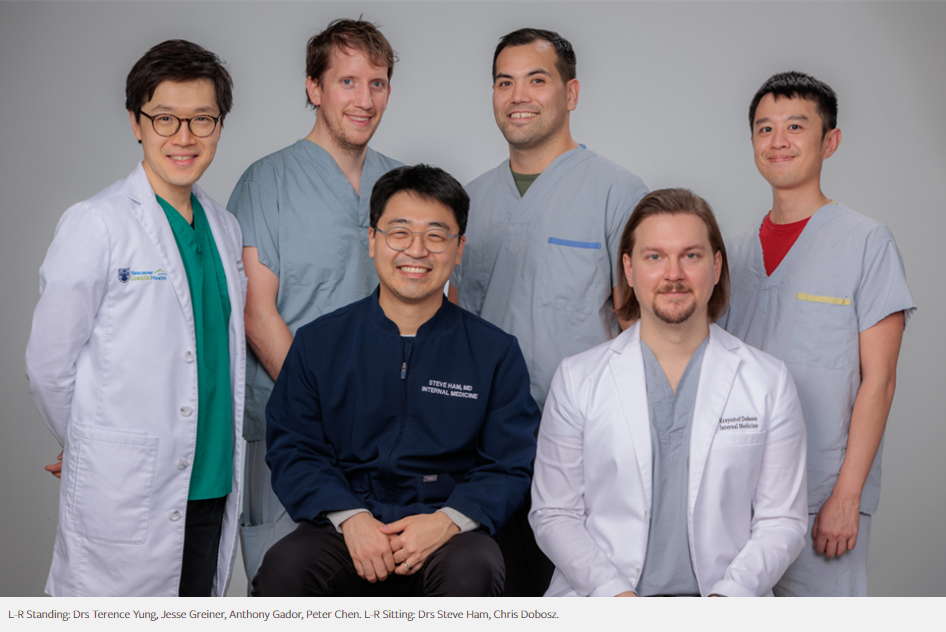March 22, 2024


An aging population and advances in surgical and anesthetic techniques mean surgeries are increasingly performed on patients who are medically complex and frail. More and more often, patients undergoing these surgeries are experiencing complications. These complications can include post-operative delirium, pneumonia and septicemia.
In 2020, the General Internal Medicine program successfully applied to the Department of Medicine Innovation Platform to create the Internal Medicine Perioperative Care Team (IMPCT). The idea was to create a multidisciplinary team of surgeons, anesthesiologists and internal medicine physicians who would work together from the pre-admission stage all the way to post discharge. The goal would be to reduce complications after surgery and readmissions to hospital.
The internal medicine team built on its longstanding relationship with the surgical and anesthesia teams to create the IMPCT co-management model of surgical care. This approach allowed them to bring a value-based care lens to the patient experience.
IMPCT in action
The anaesthesia team helps to identify higher risk patients so that the IMPCT members can optimize their health condition before surgery. Then, immediately after surgery, IMPCT starts working with anaesthesia as patients are recovering in the Post Anesthesia Care Unit (PACU). The involvement of IMPCT allows for a more seamless transition to recovery units with lower nurse to patient ratios than the PACU.
IMPCT members ensure that the surgical and anaesthesia team are aware of any complications identified by the nursing and medical teams during the patient’s recovery. IMPCT is also able to facilitate movement of patients to a higher level of care environment on a proactive basis.
IMPCT builds continuity of care by seeing the patient after discharge in an outpatient clinic. This helps prevent health decline or readmission and improves connections with primary care.
The IMPCT proposal aligned with PHC strategic directions of quality-forward, people-forward and learning-forward. The proposal also had strong stakeholder support including from the Critical Care Outreach Team (CCOT).
Leading collaborative perioperative care
“This truly collaborative service is one of only a few in the country, making St. Paul’s Hospital a leader in perioperative care,” says Dr. Su-Yin MacDonell , anesthesiologist and IMPCT member. “We are just beginning to see the benefits and I hope this collaboration continues to grow to include all surgical specialties.”
Dr. MacDonell shared an example of how IMPCT avoided a more serious complication for a patient. The patient was being followed by the anesthesia team and IMPCT. Both teams agreed the patient’s condition was not improving and needed regular reassessment. IMPCT saw the patient first and flagged for anesthesia that the patient was deteriorating rapidly with presumed pneumonia. The anesthesia team re-admitted the patient to the Surgical High Acuity Unit and initiated treatment. This was all done in 30 minutes.
“Waiting longer could have resulted in a code blue or intubation,” says Dr. MacDonell. “It’s hard to quantify but we have all seen patients ‘waiting to get sicker’ before escalating care. With IMPCT, we have created a service that intervenes before that happens.”
“The IMPCT members are approachable and work effectively with residents and physicians. They’re great teachers and we appreciate the coordination of referrals to subspecialty internal medicine physicians,” says Dr. Manoj Raval, surgeon. “IMPCT has become a fully integrated, vital part of the perioperative care team.”
Evaluating and refining for IMPCT
Over the past two years, IMPCT team members are confident that they have been able to reduce 30-day readmissions to the hospital, as well as reducing the activation of CCOT for post-surgical decompensation. They also feel they’ve improved the transition to primary care providers. The team plans to perform chart reviews to validate this assumption and publish their learnings, so that it can be adopted elsewhere. The team is currently seeking funding to undertake this work.
The Department of Medicine Innovation Platform is the avenue for Department members to address gaps in care at PHC. The initiative could span divisions, departments and beyond. If you have a great idea and want to learn how to move it forward, visit the DOM Innovation Platform website.
The DOM Innovation Platform is part of Innovarium, Providence Health Care’s innovation engine that connects people, systems, infrastructure, and partners to accelerate health innovation.

